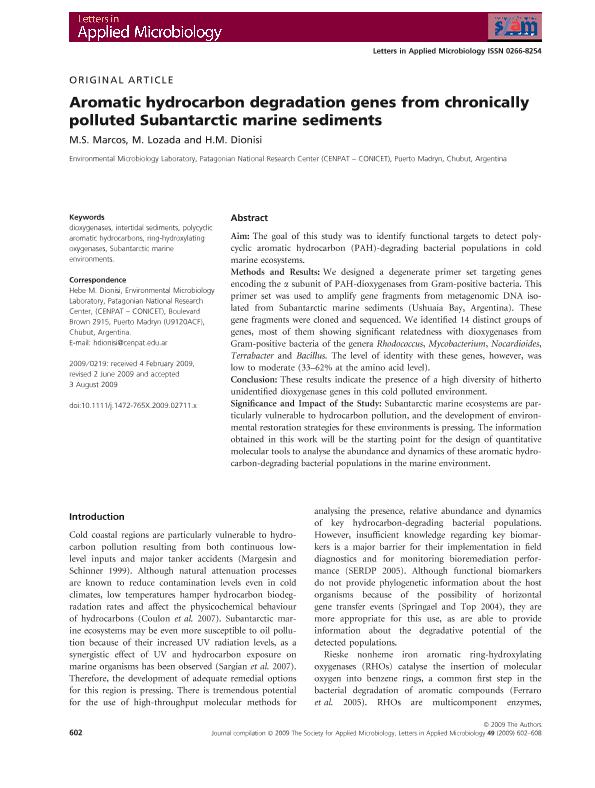Mostrar el registro sencillo del ítem
dc.contributor.author
Marcos, Magalí Silvina

dc.contributor.author
Lozada, Mariana

dc.contributor.author
Dionisi, Hebe Monica

dc.date.available
2020-01-29T15:02:06Z
dc.date.issued
2009-11
dc.identifier.citation
Marcos, Magalí Silvina; Lozada, Mariana; Dionisi, Hebe Monica; Aromatic hydrocarbon degradation genes from chronically polluted Subantarctic marine sediments; Wiley Blackwell Publishing, Inc; Letters in Applied Microbiology; 49; 5; 11-2009; 602-608
dc.identifier.issn
0266-8254
dc.identifier.uri
http://hdl.handle.net/11336/96095
dc.description.abstract
Aim: The goal of this study was to identify functional targets to detect polycyclic aromatic hydrocarbon (PAH)-degrading bacterial populations in cold marine ecosystems. Methods and Results: We designed a degenerate primer set targeting genes encoding the α subunit of PAH-dioxygenases from Gram-positive bacteria. This primer set was used to amplify gene fragments from metagenomic DNA isolated from Subantarctic marine sediments (Ushuaia Bay, Argentina). These gene fragments were cloned and sequenced. We identified 14 distinct groups of genes, most of them showing significant relatedness with dioxygenases from Gram-positive bacteria of the genera Rhodococcus, Mycobacterium, Nocardioides, Terrabacter and Bacillus. The level of identity with these genes, however, was low to moderate (33-62% at the amino acid level). Conclusion: These results indicate the presence of a high diversity of hitherto unidentified dioxygenase genes in this cold polluted environment. Significance and Impact of the Study: Subantarctic marine ecosystems are particularly vulnerable to hydrocarbon pollution, and the development of environmental restoration strategies for these environments is pressing. The information obtained in this work will be the starting point for the design of quantitative molecular tools to analyse the abundance and dynamics of these aromatic hydrocarbon-degrading bacterial populations in the marine environment.
dc.format
application/pdf
dc.language.iso
eng
dc.publisher
Wiley Blackwell Publishing, Inc

dc.rights
info:eu-repo/semantics/openAccess
dc.rights.uri
https://creativecommons.org/licenses/by-nc-sa/2.5/ar/
dc.subject
DIOXYGENASES
dc.subject
INTERTIDAL SEDIMENTS
dc.subject
POLYCYCLIC AROMATIC HYDROCARBONS
dc.subject
RING-HYDROXYLATING OXYGENASES
dc.subject
SUBANTARCTIC MARINE ENVIRONMENTS
dc.subject.classification
Biología Celular, Microbiología

dc.subject.classification
Ciencias Biológicas

dc.subject.classification
CIENCIAS NATURALES Y EXACTAS

dc.title
Aromatic hydrocarbon degradation genes from chronically polluted Subantarctic marine sediments
dc.type
info:eu-repo/semantics/article
dc.type
info:ar-repo/semantics/artículo
dc.type
info:eu-repo/semantics/publishedVersion
dc.date.updated
2019-12-12T14:48:45Z
dc.journal.volume
49
dc.journal.number
5
dc.journal.pagination
602-608
dc.journal.pais
Reino Unido

dc.journal.ciudad
Londres
dc.description.fil
Fil: Marcos, Magalí Silvina. Consejo Nacional de Investigaciones Científicas y Técnicas. Centro Nacional Patagónico; Argentina
dc.description.fil
Fil: Lozada, Mariana. Consejo Nacional de Investigaciones Científicas y Técnicas. Centro Nacional Patagónico; Argentina
dc.description.fil
Fil: Dionisi, Hebe Monica. Consejo Nacional de Investigaciones Científicas y Técnicas. Centro Nacional Patagónico; Argentina
dc.journal.title
Letters in Applied Microbiology

dc.relation.alternativeid
info:eu-repo/semantics/altIdentifier/doi/http://dx.doi.org/10.1111/j.1472-765X.2009.02711.x
dc.relation.alternativeid
info:eu-repo/semantics/altIdentifier/url/https://sfamjournals.onlinelibrary.wiley.com/doi/full/10.1111/j.1472-765X.2009.02711.x
Archivos asociados
